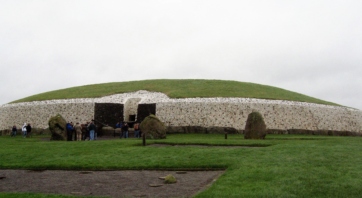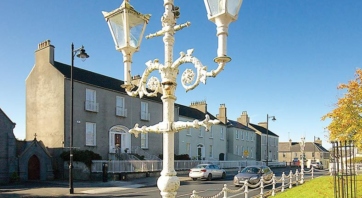
Brú na Bóinne Research Framework
The framework assesses current knowledge and research of this amazing UNESCO World Heritage Site and proposes a strategy for future research with a view to its sustainable management.

Climate change is already having significant impacts on Ireland's heritage, threatening natural and built environments as well as tangible and intangible cultural heritage.
Climate change is already having significant impacts on Ireland's heritage, threatening natural and built environments as well as tangible and intangible cultural heritage.
Increased flooding, increased frequency and intensity of extreme weather, rising sea levels, and coastal erosion are particularly damaging to historic buildings and archaeological sites, while biodiversity is affected by changing ecosystems, shifting weather patterns and new invasive species.
The Heritage Council is addressing the challenges posed by climate change through strategic partnerships and a range of programmes aimed at protecting and adapting Ireland’s heritage. By working closely with the Climate Action Regional Offices (CAROs), the Council supports climate adaptation at the local level, integrating heritage into broader regional climate strategies.
The Local Authority Heritage Officer and Biodiversity Officer programmes play a key role in this effort. Officers are embedded in communities across Ireland, facilitating local-level action to conserve heritage while adapting to climate challenges. Through their work, the Heritage Council advocates for policy changes and actions that reflect the needs of heritage conservation in a changing climate.
Partnerships with organisations like the National Biodiversity Data Centre (NBDC) and The Discovery Programme allow the Council to combine scientific research and data-driven approaches with heritage conservation, ensuring that both natural and built heritage are protected from climate impacts.
Public engagement is also central to the Council’s approach. Programmes such as Heritage in Schools and Heritage Week raise awareness about climate impacts on heritage, encouraging community involvement in conservation efforts.
The Heritage Council is working to embed sustainability requirements in all its funding schemes, ensuring that climate resilience and sustainability are at the heart of funded projects. This approach fosters long-term, climate-conscious conservation practices across Ireland’s heritage landscape.
These ongoing and future actions are key to protecting Ireland’s heritage from the impacts of climate change and ensuring that heritage contributes to climate resilience, both locally and nationally.
The Climate Change Sectoral Adaptation Plans for both Built and Archaeological Heritage and Biodiversity, developed under Ireland's National Adaptation Framework highlight these challenges and outline the actions necessary to build resilience in heritage conservation.
New Sectoral Adaptation Plans are currently being developed under Ireland’s second statutory National Adaptation Framework, which was approved by the government in June 2024. The Heritage Council will contribute to the relevant plans, particularly those addressing built heritage, biodiversity, and other areas impacted by climate change. These updated Plans are expected to be finalised by the end of Q3 2025, ensuring that key sectors continue to adapt and strengthen resilience in the face of climate challenges.

The framework assesses current knowledge and research of this amazing UNESCO World Heritage Site and proposes a strategy for future research with a view to its sustainable management.

An initiative to promote heritage-led regeneration and to improve the quality of our historic towns and villages for residents and tourists.

A collaborative approach to village planning and design that gives local communities a real voice in deciding how their villages are planned and shaped for the future.